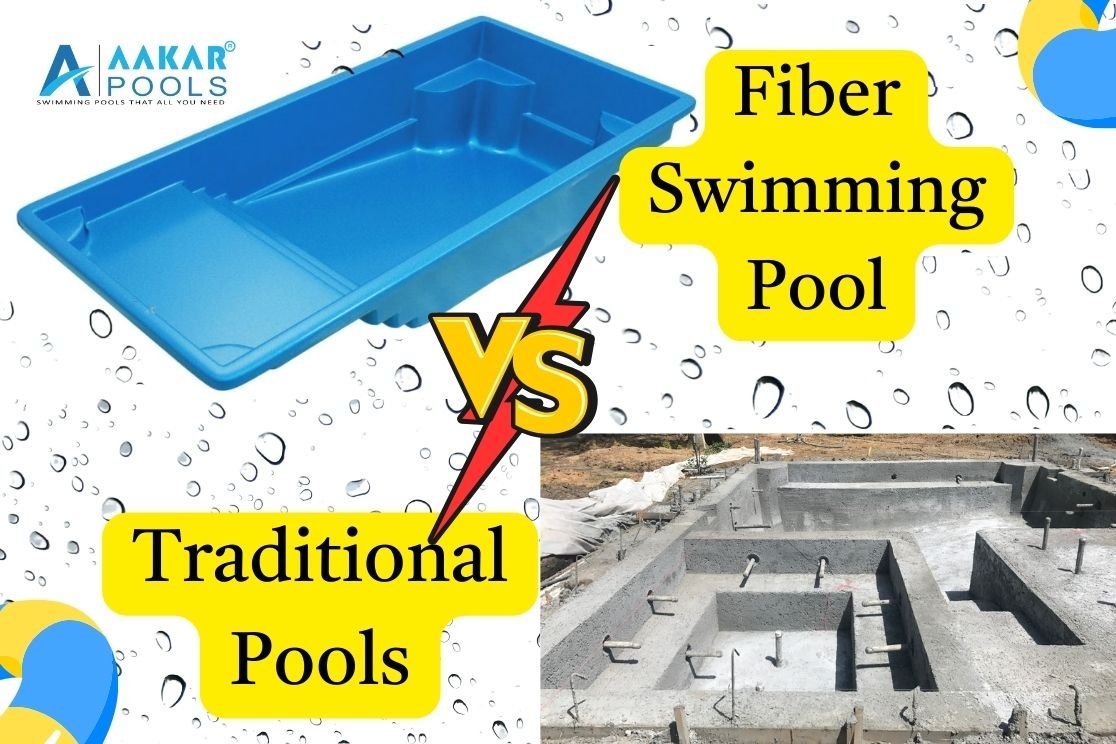Swimming pools are a fantastic addition to any home or commercial property, providing relaxation, fun, and a touch of luxury. However, when planning to install a pool, one of the key decisions you'll face is choosing between a fiber swimming pool and a traditional pool (such as concrete or vinyl). Each type has its own set of advantages and drawbacks, making it crucial to understand which option suits your needs best. In this blog, we’ll compare these two popular pool types in terms of cost, durability, maintenance, and more, helping you make an informed choice.
What is a Fiber Swimming Pool?
A fiber swimming pool is made from fiberglass-reinforced plastic, molded into a pre-designed shape. These pools are manufactured offsite and delivered as a single unit, ready for installation. Known for their durability and smooth finish, fiber swimming pools are a popular choice for residential and commercial properties.
Advantages of Fiber Swimming Pools:
- Quick Installation: Fiber swimming pools are pre-fabricated, reducing installation time to just a few days.
- Low Maintenance: The non-porous surface prevents algae buildup, making cleaning and upkeep easier.
- Durability: Resistant to cracking and structural issues, fiber swimming pools have a lifespan of up to 25 years or more.
- Smooth Finish: The surface is smooth and non-abrasive, ensuring a comfortable swimming experience.
- Energy Efficiency: The insulating properties of fiberglass help maintain water temperature, reducing heating costs.
What are Traditional Pools?
Traditional pools, such as concrete or vinyl-lined pools, are constructed onsite. Concrete pools are made by pouring concrete into a customized mold, while vinyl pools consist of a flexible liner supported by a frame.
Advantages of Traditional Pools:
- Customizable Designs: Concrete pools can be built in any shape, size, or depth, making them ideal for unique landscaping needs.
- Durability (Concrete): Properly maintained concrete pools can last several decades.
- Lower Initial Cost (Vinyl): Vinyl pools are typically more affordable upfront than other options.
Fiber Swimming Pool vs. Traditional Pools: Key Comparisons
1. Installation Time
- Fiber Swimming Pool: The pre-fabricated nature of fiber pools allows for installation in as little as 3-5 days.
- Traditional Pools: Concrete pools can take several weeks or even months to construct due to the complex process of excavation, pouring, and curing.
2. Cost and Affordability
- Fiber Swimming Pool Price: While the upfront cost of a fiber swimming pool can be higher than a vinyl pool, it is generally more affordable than a concrete pool in the long run due to lower maintenance costs.
- Traditional Pools: Concrete pools have a higher initial cost due to labor-intensive construction. Vinyl pools, on the other hand, are budget-friendly but may require frequent liner replacements.
3. Durability and Lifespan
- Fiber Swimming Pool: Resistant to cracks, algae growth, and chemical damage, fiber pools can last 25+ years with minimal repairs.
- Concrete Pools: Durable but prone to cracking over time, requiring resurfacing every 10-15 years.
- Vinyl Pools: Liners may need replacement every 5-10 years, reducing their overall lifespan.
4. Maintenance Requirements
- Fiber Swimming Pool: The smooth, non-porous surface makes cleaning easy and reduces the need for chemicals.
- Traditional Pools: Concrete pools require regular brushing to prevent algae buildup, while vinyl liners are susceptible to tears and leaks.
5. Design Flexibility
- Fiber Swimming Pool: Limited to pre-designed shapes and sizes, though manufacturers like Aakar Pools offer a wide range of options.
- Traditional Pools: Concrete pools offer unlimited design possibilities, allowing for complete customization.
6. Aesthetic Appeal
- Fiber Swimming Pool: Offers a sleek, modern look with built-in steps and seating. The gel-coat finish provides a vibrant, long-lasting color.
- Traditional Pools: Concrete pools can be enhanced with tiles, mosaics, or custom finishes for a luxurious look.
7. Environmental Impact
- Fiber Swimming Pool: The insulating properties reduce energy consumption for heating, making it an eco-friendly choice.
- Traditional Pools: Concrete and vinyl pools may require more energy and water due to higher maintenance needs.
Why Choose Aakar Pools?
If you’re considering a fiber swimming pool or a traditional pool, working with the right swimming pool manufacturer in India is essential. Aakar Pools is a trusted name in the industry, offering top-notch services for pool design, construction, and maintenance. Whether you need a reliable swimming pool builder or want competitive fiber swimming pool prices, Aakar Pools has you covered.
Services Offered by Aakar Pools:
- Custom pool designs tailored to your preferences
- High-quality materials and construction techniques
- Expert installation and after-sales support
- Affordable pricing for fiber swimming pools and traditional pools
Final Thoughts
When choosing between a fiber swimming pool and a traditional pool, it’s important to weigh the pros and cons based on your budget, timeline, and preferences. While traditional pools offer greater design flexibility, fiber swimming pools excel in terms of affordability, durability, and low maintenance. For most homeowners, a fiber swimming pool is an excellent choice that combines modern aesthetics with practicality.
Contact Aakar Pools today. As a leading swimming pool manufacturer in India, we’ll help you design and build the perfect pool for your property. Reach out to us at +91-9818095095 to get started on your dream pool project.
